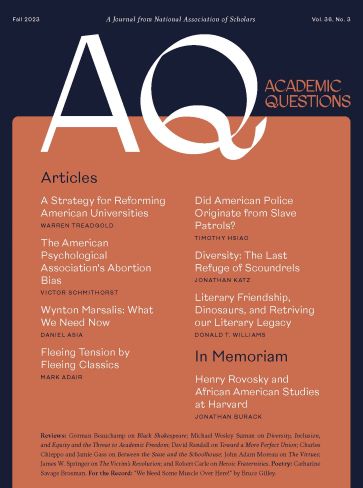amzn_assoc_tracking_id = "natioassoc07e-20"; amzn_assoc_ad_mode = "manual"; amzn_assoc_ad_type = "smart"; amzn_assoc_marketplace = "amazon"; amzn_assoc_region = "US"; amzn_assoc_design = "enhanced_links"; amzn_assoc_asins = "B0BSR8D7RZ"; amzn_assoc_placement = "adunit"; amzn_assoc_linkid = "6ae1f8698915f0a6e60f2fbdeb079bf0"; " target="_blank">The Victims’ Revolution: The Rise of Identity Studies and the Birth of the Woke Ideology, Bruce Bawer, Bombardier Books, 2022, pp. 333, $18.99 paperbound.
The present book is a reissue,1 with new pagination and a new subtitle, of a book first published in 2012, with a new introduction by the author and a new forward by Douglas Murray. The author, whose education centered on the study of literature, received his Ph.D. but decided on a career in journalism rather than academia. The destruction that postmodernism and its ideological offshoots were raining down upon academic English departments had already become obvious.
The book is structured around a chapter length treatment of several of the varieties of identity studies in the universities. Chapter One discusses the background to identity studies in the writings of Gramsci, Freire, Fanon, and others and introduces the reader to some of the jargon that has dominated the humanities in the last few decades (neoliberalism, gaze, problematize, etc.). The subsequent chapters deal with feminism, black studies, queer studies, and Chicano studies, with a final chapter devoted to cultural studies, disability studies, fat studies, men’s studies, and whiteness studies.
The book is a pleasure to read. The style is entirely appropriate to the subject, critical, but rarely polemical, and it eschews the name calling that pervades the ideologists it analyzes. Almost any reader will learn something new. I had thought that I was well acquainted with the forms of collectivism centering on American Indians and Latin American ancestry, but Bawer’s chapter on Chicano studies brought out aspects of those movements that I was not familiar with.
The chapter on Chicano Studies shows how activists portray the conquering Spanish and later the conquering Anglos as irretrievably brutal and racist. Pre-Columbian American Indian civilizations were, by contrast, more advanced than those of the Old World, not only intellectually and spiritually, but in terms of nonaggression.
This extraordinary claim is refuted by the merest exposure to the actual evidence from history and archaeology. Indeed, one of the most striking results of the last fifty years of research on the Maya is the demonstration that the Classic Maya were not the peaceful astrologers contemplating the heavens they had been thought to be. Rather, they were preoccupied with warfare, dynastic competition, bloodletting, and human sacrifice.
This is, of course, not to deny, the actual positive accomplishments of the Maya, and the same research has resulted in the deciphering of Maya writing, which previously had been largely a mystery.
The advocates of victimism who inhabit these studies disciplines attribute glowing qualities to their own category of study (usually race) and nothing but evil and viciousness to the oppressor category (usually the white race). Thus, the advocates of Black Studies claim that the ancient Egyptians were actually black and that Egypt was the source of all of the important achievements improperly attributed to the Greeks, who in fact stole them from the Egyptians. This is a matter on which former National Association of Scholars board member Mary Lefkowitz has written and edited a number of books which show the tenuousness—more often the falsity—of such claims. Her book History Lesson: A Race Odyssey (2008) is a very readable introduction to these issues.
The most attractive feature of the book is the use of a method of participant observation, similar to that of cultural anthropology. Bawer attended several meetings of the various would-be disciplines (usually called “studies”) of the victimist ideology. He records his observations of the presenters, the discussants, the moderators, and the audience, as well as the contents of the presentations, the audience reactions, and the character of the follow-up comments apart from the formal talks. The very spontaneity and unprepared characters of the participation gives the reader insight into the ideology, assumptions, and motivation behind the presentations and their audience.
There are some limitations to the book. There is no index, and there are no footnotes or endnotes to direct readers to the sources of the quotations in the text, although some are clearly from Bawer’s own interviews. The Selected Bibliography gives only authors and titles, with no other information. The book omits any serious discussion of the transgender movement although it is referred to glancingly. This is, to me, a significant omission. The revised edition was published in 2022 and the Introduction to the Tenth Anniversary Edition would have been an excellent place for the discussion. I would like to see someone of Bawer’s powers of perception and analysis discuss the relationship between the collectivism of the victims’ identity movement and the “expressive individualism” that strangely seems to accompany it and has since the time of Rousseau. But the above critiques are very much secondary matters. Bawer’s is a seminal book tracing the academic development of the ideologies that currently dominate American intellectual life.
James W. Springer is a retired attorney; [email protected]. He is the co-author with Elizabeth Weiss of Repatriation and Erasing the Past (University of Florida Press 2020). Springer last appeared in AQ with his article “Three Public Philosophies and Some Implications,” in summer 2022.
1 Original publication: Bruce Bawer, The Victim’s Revolution: The Rise of Identity Studies and the Closing of the Liberal Mind (Harper Collins, 2012).
Photo by Robbie Herrera on Unsplash














